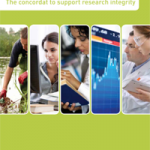 Today’s spotlight is on Research Misconduct.
Today’s spotlight is on Research Misconduct.
The University’s Research Misconduct Policy & Procedure defines research misconduct to include (but is not limited to):
- fabrication: making up results or other outputs and presenting them as though they were real;
- falsification: manipulating research processes or changing or omitting data without proper cause;
- piracy: the deliberate exploitation of ideas from others without proper acknowledgement;
- plagiarism: the copying or misappropriation of ideas (or their expression), text, software or data (or some combination thereof) without permission and due acknowledgement;
- misrepresentation: the deliberate attempt to represent falsely or unfairly the ideas or work of others, whether or not for personal gain or enhancement;
- academic fraud: deliberate deception which includes the invention or fabrication of data and/or experimentation;
- improprieties of authorship: including improper inclusion or exclusion of individuals as authors; misrepresentation or duplication of substantially similar material that has previously been the focus of one’s own published research findings without due referencing;
- non-compliance of research governance: failure to comply with appropriate internal and external requirements such as regulatory, financial, legal and/or ethical approval;
- serious breach of research ethics as defined in 8B – Research Ethics Code of Practice and where not dealt with through student/staff disciplinary or other University procedure;
- facilitating misconduct in research: deliberate concealment of research misconduct by others or collusion in such research;
- inciting others to commit research misconduct; deliberate encouragement of others to conduct research in an untruthful or unfair manner;
- improper dealing with allegations of research misconduct: failing to address possible infringements such as attempts to cover up research misconduct and reprisals against whistleblowers.
BU acknowledges that whilst ‘honest errors and differences in, for example, research methods and interpretations are not examples of research misconduct, academics [researchers] are expected to maintain their knowledge and awareness of relevant internal and external requirements’[1].
How to report research misconduct
The Deputy Vice Chancellor (DVC) has overall responsibility for the policy and procedure and its implementation when a formal allegation of research misconduct against a member of the University is received.
Formal allegations of research misconduct should be put in writing to the DVC. If you are unsure whether to report a breach of research integrity under the Research Misconduct Policy, you can seek confidential advice from the University’s Research Ethics Panel Chairs. The Panel Chairs can help you to establish whether concerns related to research integrity should be reported for investigation. Click on the University’s Named Contacts.
Further details about the reporting procedure can be found in the Research Misconduct Policy (section 6).
You can also report a concern about serious malpractice under the Public Interest Disclosure legislation – “Whistleblowing” (Disclosure in the Public Interest) Policy.
Breaches to research integrity can be damaging to individuals and cause reputational harm to both our research community and the University. It undermines public trust and causes harm. Therefore, understanding what constitutes misconduct and attending appropriate workshops is key to avoid making mistakes and to prevent breaches in research integrity.
Don’t forget
We are planning Research Integrity Week 2022, when keynote speakers and interactive workshops will be available, giving you the opportunity to find out more about research integrity, how it might impact your research, and the opportunity to discuss with others when dealing with issues which can come up in the field or working within your Teams.
More details to be announced over the coming weeks.
 Research Integrity – Researchers’ Responsibilities
Research Integrity – Researchers’ Responsibilities










 Second NIHR MIHERC meeting in Bournemouth this week
Second NIHR MIHERC meeting in Bournemouth this week Dr. Ashraf cited on ‘Modest Fashion’ in The Guardian
Dr. Ashraf cited on ‘Modest Fashion’ in The Guardian NIHR-funded research launches website
NIHR-funded research launches website MSCA Postdoctoral Fellowships 2025 Call
MSCA Postdoctoral Fellowships 2025 Call ERC Advanced Grant 2025 Webinar
ERC Advanced Grant 2025 Webinar Horizon Europe Work Programme 2025 Published
Horizon Europe Work Programme 2025 Published Horizon Europe 2025 Work Programme pre-Published
Horizon Europe 2025 Work Programme pre-Published Update on UKRO services
Update on UKRO services European research project exploring use of ‘virtual twins’ to better manage metabolic associated fatty liver disease
European research project exploring use of ‘virtual twins’ to better manage metabolic associated fatty liver disease